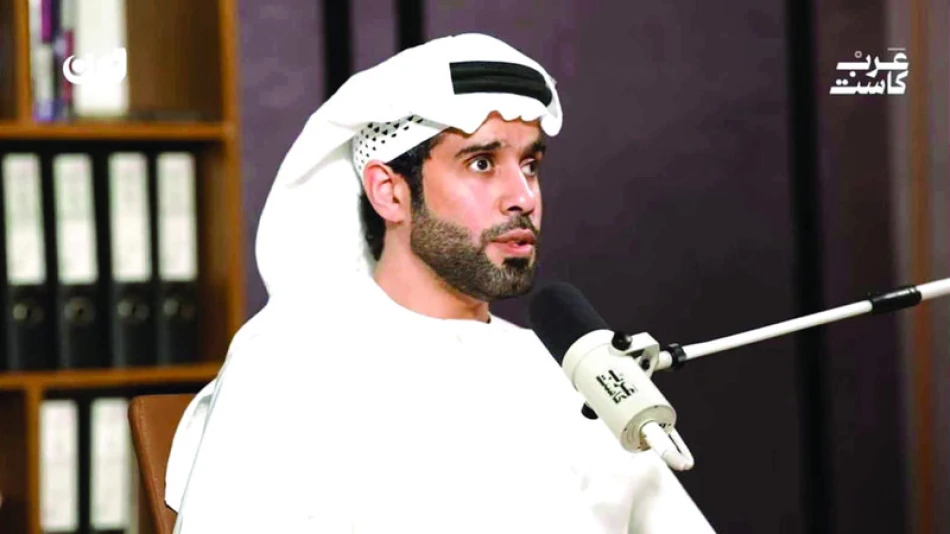
Visually Impaired Student Rises to Senior Dubai Police Manager: Sief Al Falasi's Inspiring Journey
Dubai's Legal Pioneer: How the UAE is Redefining Inclusion and Digital Asset Regulation
Saif Al Falasi has made history as the first person with disabilities to head legal affairs at Dubai Police and across the Arab world, while simultaneously helping shape the UAE's emerging regulatory framework for virtual assets. His journey from academic excellence to legal leadership reflects broader shifts in how progressive governments approach both social inclusion and digital innovation.
Breaking Barriers in Law Enforcement Leadership
Al Falasi's appointment signals a significant evolution in the UAE's approach to disability inclusion within government institutions. Rather than requiring integration, he describes being "born integrated" into society, crediting his family for never making him feel different despite being visually impaired.
His academic achievements—graduating high school with 97% and later finishing third in his class at Dubai Police Academy after switching from sciences to law—demonstrate the untapped potential that inclusive hiring practices can unlock. This mirrors similar initiatives in Singapore and parts of Europe, where governments actively recruit diverse talent for senior positions.
The Philosophy Behind Legal Practice
Al Falasi's approach to law enforcement emphasizes substance over rigid application. "Blind application of law strips it of its essence," he argues, noting that laws exist to protect rights, not eliminate them through mechanical enforcement. This philosophy has yielded measurable results: his motivational approach to handling administrative violations reduced infractions by over 90%.
This human-centered legal framework aligns with broader trends in progressive jurisdictions, where restorative rather than purely punitive approaches are gaining traction among law enforcement agencies.
UAE's Strategic Position in Virtual Asset Regulation
Dubai Police's early involvement in virtual asset regulation places the UAE ahead of many jurisdictions still grappling with cryptocurrency oversight. Al Falasi confirms that Dubai Police was among the first entities to propose regulating this sector, working alongside specialized government agencies.
Defining the Digital Asset Landscape
The UAE's regulatory framework encompasses digital generations produced by electronic algorithms that create images with value and virtual rights owned by real people. This broad definition suggests Dubai is positioning itself to regulate not just cryptocurrencies, but NFTs, digital art, and emerging blockchain-based assets.
This comprehensive approach contrasts sharply with the fragmented regulatory responses seen in the United States, where different agencies often provide conflicting guidance. By establishing clear, unified regulations, Dubai appears to be following the Singapore model of creating regulatory clarity to attract legitimate digital asset businesses.
Continuous Evolution and Global Competition
The legal framework remains under constant development and review to keep pace with global digital evolution. This adaptive approach positions Dubai to compete with established crypto hubs like Switzerland's Crypto Valley and emerging centers in Asia.
For investors and digital asset companies, this regulatory clarity reduces compliance uncertainty—a major factor in business location decisions. The UAE's proactive stance could attract firms seeking alternatives to more restrictive jurisdictions or those with unclear regulatory environments.
Law Enforcement in the Digital Age
Al Falasi's warnings about unauthorized filming of police operations and sharing content that damages infrastructure reputation reflect how traditional law enforcement must adapt to social media realities. The UAE's strict stance on filming police chases or natural disasters for social media distribution demonstrates how governments balance transparency with security concerns.
Modern Policing Philosophy
Dubai Police's approach to high-speed pursuits—reserved only for dangerous criminals committing serious felonies—reflects the UAE's low crime rates compared to jurisdictions where such pursuits are routine. This measured approach to enforcement mirrors the country's broader strategy of prevention over reaction.
The severe penalties for ramming security barriers—up to life imprisonment in cases involving serious injury or death—underscore the UAE's zero-tolerance approach to security threats, particularly relevant given the country's position as a global business and tourism hub.
Implications for Regional Development
Al Falasi's success story and the UAE's progressive policies on both inclusion and digital assets signal broader regional competition for talent and investment. As neighboring countries observe the UAE's approach to integrating people with disabilities into senior government roles, similar initiatives may follow.
His employment of approximately 100 people with disabilities demonstrates how inclusive policies can scale beyond symbolic appointments to create systemic change. This practical approach to inclusion, combined with cutting-edge digital asset regulation, positions the UAE as a model for other developing economies seeking to modernize their legal and social frameworks simultaneously.
The intersection of social progress and technological innovation in Al Falasi's career reflects the UAE's broader strategy of leveraging human capital diversity to maintain competitive advantages in emerging sectors like digital finance and blockchain technology.
Most Viewed News

 Sara Khaled
Sara Khaled






